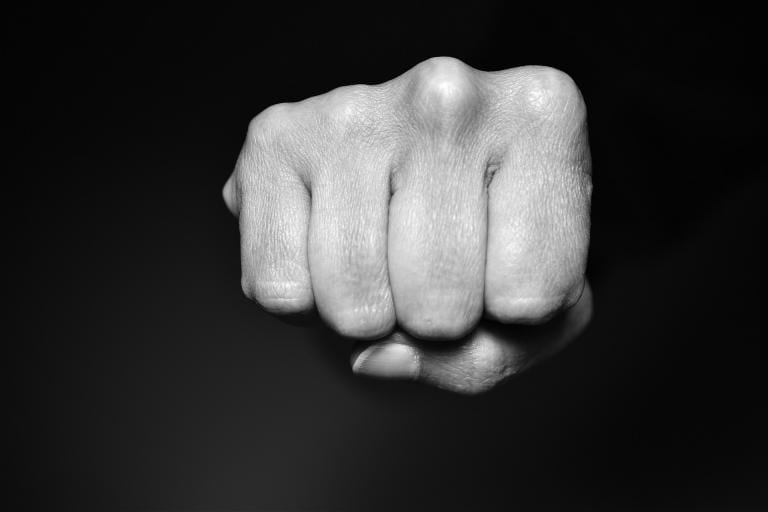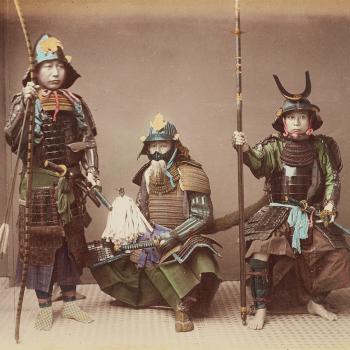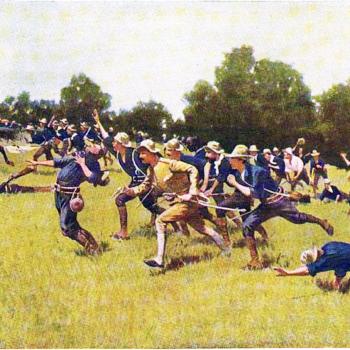The Zen term kōan literally means “public record.” Originally it referred to an interaction or incident that was recorded and used as a teaching example. In some schools of Zen, kōan practice evolved over time so that it has the student facing a question which cannot be reasonably answered, yet which demands an answer — the famous “what is the sound of one hand clapping” or the challenge to “show me your face before your mother was born.”
Another example is “Kyogen Mounts the Tree” from the Mumonkan (Gateless Gate) [Nyogen Senzaki and Paul Reps translation]:
Kyogen said: “Zen is like a man hanging in a tree by his teeth over a precipice. His hands grasp no branch, his feet rest on no limb, and under the tree another person asks him: ‘Why did Bodhidharma come to China from India?'”
“If the man in the tree does not answer, he fails; and if he does answer, he falls and loses his life. Now what shall he do?”
Bodhidharma was the mythical founder of Zen; in the language of Zen, asking why Bodhidharma came to China from India is to ask “Please teach me about Zen.” In some versions of the koan, if the man does not answer he not only fails in his duty but will be killed for his failure.
Imagine it! You’re hanging high above the ground by your teeth, only your jaw gripping the branch or a rope or something. Feel the pain and fatigue of your jaw muscles. And here comes a question you must answer. To speak you must let go, but to let go is to die, and if you die you can’t speak, but if you don’t speak you fail and die.
(The dilemma is the inspiration for the title of a fine collection of dharma talks, Open Mouth Already A Mistake, by Wu Kwang.)
The idea of this sort of practice is that the student keeps beating their head against that unsolvable riddle until their rational mind gives up, and permits a response from the unconditioned mind.
At first glance the 1980s action movie Roadhouse seems a world away from the eight-century-old Mumonkan. In that movie Patrick Swayze plays a bouncer named Dalton, who is hired to clean up a bar where violence has become commonplace. Of course, this being the movies, he ends up not just cleaning up the bar but stopping the corrupt businessman who owns the town, and wins the heart of the beautiful woman.
Be Nice
In one notable scene, when Dalton takes over he gives instructions to his staff, starting with the primary rule: be nice. Some of the bouncers have questions about this plan:
Dalton: If somebody gets in your face and calls you a c*cks*cker I want you to be nice…Ask him to walk, be nice. If he won’t walk, walk him, but be nice. If you can’t walk him, one of the others will help you and you will both be nice. I want you to remember that it’s the job, it’s nothing personal.
Bouncer 1: Being called a c*cks*cker isn’t personal?
Dalton: No, it’s two nouns combined to elicit a prescribed response.
Bouncer 1: What if somebody calls my Mama a whore?
Dalton: Is she? [Laughter.] I want you to be nice — until it’s time to not be nice.
Bouncer 2: So, how are we supposed to know when that is?
Dalton: You won’t. I’ll let you know.
In the Manichean world of an action movie, it’s easy to tell when it’s time to not be nice, easy to tell the drunken patron who just needs to go home and sober up from the true bad guys. But for those of us who live in the messy and ambiguous real world, “when is it time to stop being nice?” is actually one heck of a question.
Indeed, perhaps for those of us whose Zen in rooted in the practice of the martial arts, it might fill the role of a kōan.

When is it time to stop being nice and use force? When do we shift from being being Kannon, Avalokiteśvara, the Bodhisattva of mercy and compassion who hears the cries of the world, to being Fudō Myō-ō, Acala, the wrathful deity “whose powers are of lava, of magma, of deep rock strata, of gunpowder, and the Sun”, in the words of poet Gary Snyder?
The budōka, the martial artist, is called on to be benevolent and merciful and calm; but also devotes much of their life to developing the capability to act with great violence.
There is a reason that Zen Buddhism has assigned deities to personify both of these attributes. Neither can be neglected.
In one conversation with a student who was worried about his son wanting a toy gun, the 20th century Zen Master Seung Sahn said:
Your son wants a toy gun. You think that that is not so good. But instead, you should view the problem as: How do you use this correctly? Don’t make good or bad: how do you teach the correct function of this gun, OK? That’s very important—more important than just having a gun or not. If you use this gun correctly, you can help many people, but if it is not used correctly, then maybe you will kill yourself, kill your country, kill other people. So the gun itself is originally not good, not bad. More important is: what is the correct function of this gun?
What is the correct function of the gun, or the fist, or of the sword and lariat that Fudō Myō-ō is usually portrayed as carrying?
Wrong Answers
Like many deep questions, this has had many simple, straightforward, and entirely wrong answers proposed for it.
One popular answer is that laws or political processes can give us the answer: that we can turn our judgment over to legislators, judges, or superior officers.
Those in power have good reasons for promoting this answer. To maintain their power they need people who will be nice to them and non-nice to their opponents. They need enforcers, witting or unwitting, who will be non-nice only upon their orders. But “I was only following orders” didn’t fly at Nuremberg.
Some organized religions provide their own sets of propositions, detailed moral rules about when to be merciful and when war or killing is sanctioned. Zen inherits from Taoism a skepticism about this sort of moralism. Lao Tzu referred to such rulesets when he wrote, “If we could renounce our benevolence and discard our righteousness, the people would again become filial and kindly.” Many Taoist stories follow the theme of a Taoist sage chiding a Confucian for too much rule-bound moralism.
Zen absorbed this skepticism. Hui Neng, the Sixth Patriarch of Zen, cut through the tangles of ethical dilemmas when he asked a monk, “When you do not think good and when you do not think not-good, what is your true self?”
We cannot give our moral judgment — the definition of “good” and “not-good” — over to others, to generals or legislators or priests who will point out an enemy and say, “Be nice to everyone but them.”
No Enemy
For as the Discordians say, “There is no enemy anywhere.”
I think often of a passage from Jack Kerouac’s The Dharma Bums, which concisely explains the compassionate teachings of Mahayana Buddhism:
“I sit down and say, and I run all my friends and relatives and enemies one by one in this, without entertaining any angers or gratitudes or anything, and I say, like ‘Japhy Ryder, equally empty, equally to be loved, equally a coming Buddha,’ then I run on, say to ‘David O. Selznick, equally empty, equally to be loved, equally a coming Buddha’ though I don’t use names like David O. Selznick, just people I know because when I say the words ‘equally a coming Buddha’ I want to be thinking of their eyes, like you take Morley, his blue eyes behind those glasses, when you think ‘equally a coming Buddha’ you think of those eyes and you really do suddenly see the true secret serenity and the truth of his coming Buddhahood. Then you think of your enemy’s eyes.”
Can you imagine that? Think of the politician you most loathe, Donald Trump or Hillary Clinton or Boris Johnson or Jeremy Corbin, whomever. Think of an awful criminal, a mass murderer, Adam Lanza or Charles Manson or Jeffrey Dahmer or Dylan Roof, Hitler or Stalin or Mao or Pol Pot. Think of them as equally empty, equally to be loved, equally a coming Buddha as the greatest leaders or wisdom teachers.
Or if that’s too abstract, think of the guy who cut you off on the road this morning, or the bully who picked on you when you were ten years old. Your enemy is equally empty, equally to be loved, equally a coming Buddha as your loved ones, your family and friends.
It’s impossible! It can’t be! It’s as impossible as the Bodhisattva’s vow to save all sentient beings…or as Kyogen’s challenge to explain the teachings of Zen while hanging by one’s teeth.
That doesn’t mean that if one of these coming Buddhas, confused and ignorant of their own Buddha-hood, behaves aggressively that we just stand by and let them attack others. That’s just refusing to grapple with the question. Compassion for those whom the aggressors would attack drives us to take action, even violent action if necessary. But as the Tao Te Ching says,
His enemies are not demons,
but human beings like himself.
He doesn’t wish them personal harm.
Nor does he rejoice in victory.
How could he rejoice in victory
and delight in the slaughter of men?He enters a battle gravely,
with sorrow and with great compassion,
as if he were attending a funeral.
[Stephen Mitchell translation]
The Sword That Gives Life
On my left arm I have a tattoo of the kanji “katsu jin ken”, “the sword that gives life.” It is half of the proverb “satsu jin ken katsu jin ken”, “the sword that takes life is the sword that gives life”: another phrasing of the great riddle-koan of violence, carved into my flesh so that I see it in the mirror every morning when I step out of the shower.
That wrathful deity Fudō Myō-ō/Acala carries a sword as a key part of his iconography. We might expect that, with the wrath and all. But so does Mañjuśrī, the Bodhisattva of wisdom and insight, whose sutra (the “Sūtra of Mahā-Prajñā-Pāramitā Pronounced by Mañjuśrī Bodhisattva”) tells us that the key to insight is take all equally, to not compare or differentiate this against that, not even “good” against “evil”:
Not knowing [not perceiving subject and object] is the inconceivable state. The inconceivable state is what Buddhas know, such as neither grasping nor not grasping, seeing neither the appearance of past, present, or future, nor the appearance of coming or going, and grasping neither birth nor death, neither cessation nor perpetuity, neither arising nor acting. This knowledge is called the true wisdom-knowledge, the inconceivable wisdom-knowledge. Like the open sky, with neither appearances nor features, in unequaled equality, it makes no comparison, neither this against that nor good against evil.
Mañjuśrī’s sword is said to represent cutting through delusions and preferences of this versus that, for and against, so that we can get to the point of knowing that all these comparisons are just mental constructions.
As the Third Patriarch, Seng Ts’an, put it, “The conflict between right and wrong / Is the sickness of the mind.”
Or, in Dalton’s words in Roadhouse, it’s about knowing that “it’s nothing personal”, that being a human being in any given moment — even a moment where someone is in your face calling you a c*cks*cker — is just a job.

















